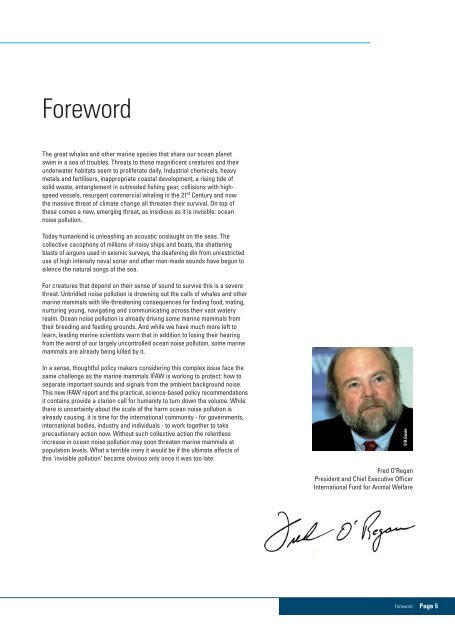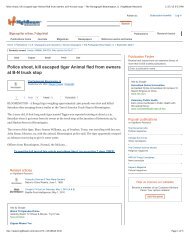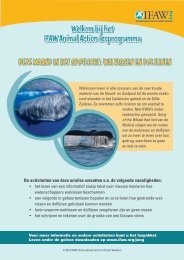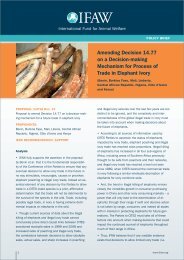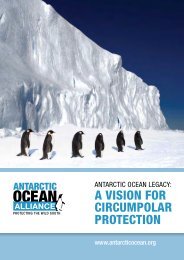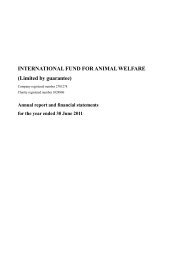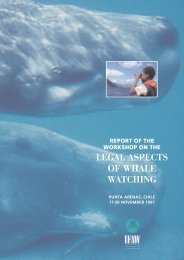Ocean Noise: Turn it down - Ocean Conservation Research
Ocean Noise: Turn it down - Ocean Conservation Research
Ocean Noise: Turn it down - Ocean Conservation Research
Create successful ePaper yourself
Turn your PDF publications into a flip-book with our unique Google optimized e-Paper software.
Foreword<br />
The great whales and other marine species that share our ocean planet<br />
swim in a sea of troubles. Threats to these magnificent creatures and their<br />
underwater hab<strong>it</strong>ats seem to proliferate daily. Industrial chemicals, heavy<br />
metals and fertilisers, inappropriate coastal development, a rising tide of<br />
solid waste, entanglement in outmoded fishing gear, collisions w<strong>it</strong>h highspeed<br />
vessels, resurgent commercial whaling in the 21 st Century and now<br />
the massive threat of climate change all threaten their survival. On top of<br />
these comes a new, emerging threat, as insidious as <strong>it</strong> is invisible: ocean<br />
noise pollution.<br />
Today humankind is unleashing an acoustic onslaught on the seas. The<br />
collective cacophony of millions of noisy ships and boats, the shattering<br />
blasts of airguns used in seismic surveys, the deafening din from unrestricted<br />
use of high intens<strong>it</strong>y naval sonar and other man-made sounds have begun to<br />
silence the natural songs of the sea.<br />
For creatures that depend on their sense of sound to survive this is a severe<br />
threat. Unbridled noise pollution is drowning out the calls of whales and other<br />
marine mammals w<strong>it</strong>h life-threatening consequences for finding food, mating,<br />
nurturing young, navigating and communicating across their vast watery<br />
realm. <strong>Ocean</strong> noise pollution is already driving some marine mammals from<br />
their breeding and feeding grounds. And while we have much more left to<br />
learn, leading marine scientists warn that in add<strong>it</strong>ion to losing their hearing<br />
from the worst of our largely uncontrolled ocean noise pollution, some marine<br />
mammals are already being killed by <strong>it</strong>.<br />
In a sense, thoughtful policy makers considering this complex issue face the<br />
same challenge as the marine mammals IFAW is working to protect: how to<br />
separate important sounds and signals from the ambient background noise.<br />
This new IFAW report and the practical, science-based policy recommendations<br />
<strong>it</strong> contains provide a clarion call for human<strong>it</strong>y to turn <strong>down</strong> the volume. While<br />
there is uncertainty about the scale of the harm ocean noise pollution is<br />
already causing, <strong>it</strong> is time for the international commun<strong>it</strong>y - for governments,<br />
international bodies, industry and individuals - to work together to take<br />
precautionary action now. W<strong>it</strong>hout such collective action the relentless<br />
increase in ocean noise pollution may soon threaten marine mammals at<br />
population levels. What a terrible irony <strong>it</strong> would be if the ultimate effects of<br />
this `invisible pollution’ became obvious only once <strong>it</strong> was too late.<br />
©B.Gavin<br />
Fred O’Regan<br />
President and Chief Executive Officer<br />
International Fund for Animal Welfare<br />
Foreword<br />
Page 5


